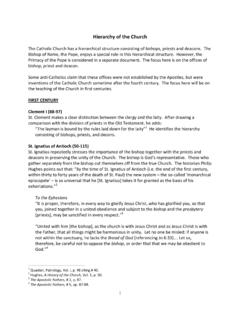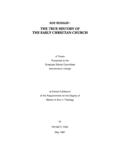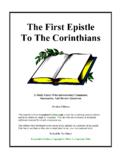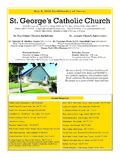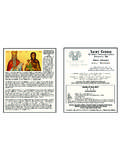Transcription of International Bible Lessons Commentary Acts 18:1 …
1 International Bible Lessons Commentary acts 18:1-11, 18-21 King James Version International Bible Lessons Sunday, November 29, 2015 Parkhurst, Jr. The International Bible lesson (Uniform Sunday School Lessons Series) for Sunday, November 29, 2015, is from acts 18:1-11, 18-21. Questions for Discussion and Thinking Further follow the verse-by-verse International Bible lesson Commentary . Study Hints for Discussion and Thinking Further discusses Questions for Discussion and Thinking Further to help with class preparation and in conducting class discussion: these hints are available on the International Bible Lessons Commentary website along with the International Bible lesson that you may want to read to your class as part of your Bible study.
2 If you are a Bible student or teacher, you can discuss each week s Commentary and lesson at the International Bible lesson Forum. International Bible lesson Commentary acts 18:1-11, 18-21 ( acts 18:1) After these things Paul departed from Athens, and came to Corinth; After Paul spoke in the Areopagus in Athens, some believed. Then Paul went to the port city of Corinth, the chief city in Achaia (in Greece), about 50 miles west of Athens. From Corinth, Paul wrote two letters to Thessalonica (that we have in the Bible ). A few years later, he wrote his letter to Rome from Corinth. As we learn from history and First and Second Corinthians, Corinth was an immoral city and that immorality sometimes spread into the church and required church discipline and advice from Paul.
3 ( acts 18:2) And found a certain Jew named Aquila, born in Pontus, lately come from Italy, with his wife Priscilla; (because that Claudius had commanded all Jews to depart from Rome:) and came unto them. Pontus is a region on the southern coast of the Black Sea (now located in modern Turkey). Paul called Priscilla Prisca in his letters. Paul may have led Aquila and Priscilla to faith in Jesus Christ after he met them: Luke did not say. Or they may have become Christians after Jewish Christians returned to Rome after their experience on the Day of Pentecost. The Roman Emperor Claudius ordered the Jews from Rome around 49 because they were making trouble, perhaps causing trouble with Jewish 2 Christians in Rome all Jews were ordered to leave Rome.
4 Many Jews and Jewish Christians had returned by the time Paul wrote his Letter to the Romans about 57 ( acts 18:3) And because he was of the same craft, he abode with them, and wrought: for by their occupation they were tentmakers. Customarily, rabbis did not take money for their teaching, so rabbis learned a trade. Paul s trade was tentmaker or leather worker. Today, those in Christian ministry who support themselves and their families primarily with a trade or profession are often called in tent-making ministry. From his letters, we know that Paul was pleased that his tent-making ministry enabled some of his churches to grow without being burdened by his expenses.
5 ( acts 18:4) And he reasoned in the synagogue every sabbath, and persuaded the Jews and the Greeks. Because Paul honored the Sabbath, he did not work at his trade of tent-making on the Sabbath but went to the synagogue to teach the Jews and God-fearing Gentiles about Jesus. As was his custom, Paul reasoned with them from the Scriptures to prove that Jesus had fulfilled their prophets predictions and Jesus needed to die and rise again for the forgiveness of sins and to give eternal life to believers in Him. ( acts 18:5) And when Silas and Timotheus were come from Macedonia, Paul was pressed in the spirit, and testified to the Jews that Jesus was Christ.
6 From Paul s letters to the church in Thessalonica, we know Paul rejoiced over what Silas and Timothy reported about the church. Paul wrote to the church: And so you became a model to all the believers in Macedonia and Achaia (1 Thessalonians 1:7). Silas and Timothy provided the financial support for Paul to focus daily on proclaiming the good news to the Jews that Jesus was the Messiah the prophets had foretold would come. ( acts 18:6) And when they opposed themselves, and blasphemed, he shook his raiment, and said unto them, Your blood be upon your own heads; I am clean: from henceforth I will go unto the Gentiles.
7 From Paul s response at being abused and reviled after he shared the good news, we see clearly that believers can be true to their faith in Christ by simply walking away and leaving such abusers completely alone. It is no sign of a lack of love or faith to tell someone, I am innocent in what I have said and done; therefore, I am not responsible for what happens to you from this day forth. I will now spend my time with others. Jesus told His disciples, If anyone will not welcome you or listen to your words, leave that home or town and shake the dust off your feet (Matthew 10:4). Paul shook his clothes as he left the synagogue, a symbolic action and message the Jews in the synagogue would understand.
8 In Paul s case, as he turned to new people, primarily to the Gentiles in Corinth, his leaving led to more people coming to faith in Jesus Christ. 3 ( acts 18:7) And he departed thence, and entered into a certain man's house, named Justus, one that worshipped God, whose house joined hard to the synagogue. Titus (or Titius) was a worshiper of God (or a God-fearing Gentile) who Paul led to believe in Jesus. He had attended worship in the synagogue where he had heard Paul teach, and he lived next door to the synagogue. The Jews who had come to believe in Jesus could attend their synagogue services and also attend Christian teaching in the home of Titus as long as the synagogue leaders allowed them to attend the synagogue as believers in Jesus.
9 Paul did not exclude the unbelieving Jews from his life and ministry, and Titus nearby home left Paul accessible to them if they changed their minds about Jesus or him and they sought him and his teaching. But Paul refused to go to the unbelieving Jews in the synagogue and open himself to further abuse and rejection. ( acts 18:8) And Crispus, the chief ruler of the synagogue, believed on the Lord with all his house; and many of the Corinthians hearing believed, and were baptized. Crispus, the synagogue leader, and his whole household became believers in the Lord Jesus. The good news of Jesus spread to both Jews and Gentiles in Corinth: they believed and were baptized.
10 Paul stayed long enough in Corinth that after he left the Church began to divide into groups or parties around different leaders; so, from his first letter to Corinth we learn that he had personally baptized Crispus: I thank God that I did not baptize any of you except Crispus and Gaius (1 Corinthians 1:14). Luke showed the good results of Paul s changing the focus of his ministry. By refusing to waste his time with those who had committed themselves to rejecting him and his teaching about Jesus, Paul was able to reach those God wanted him to reach with the time and strength he had for the Lord s service while in Corinth.










